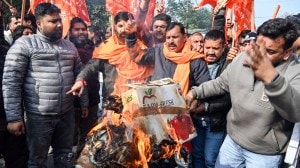Cultivators versus gatherers
The story of the goose that laid the golden eggs is a fable; it never happened. Yet, the story has survived for over two thousand years. Tha...

The story of the goose that laid the golden eggs is a fable; it never happened. Yet, the story has survived for over two thousand years. That fable fascinates to this day because it has a resonance. Even now, there are many productive units which lay golden eggs like the goose in the fable. Like in the fable, there are powerful persons who prefer to kill such productive units rather than be content with one gold egg a day. Those who are clamouring for reservation in the private sector are of that kind.
In the beginning, there were hunter-gatherers. They took what was available; they did not create anything new, except weapons of destruction, an axe here, a bow and arrow there. They spent their time searching for what was already there. Cultivators who came later were different; they sowed, they ploughed and they harvested. They made things grow that would not have grown on their own. In pursuit of their business, they did not create weapons of destruction the way hunters did; they created only better tools for more production. Therefore, cultivators were physically weaker than hunter-gatherers. In any direct confrontation, hunter-gatherers would win hands-down.
Cultivators planned months in advance, to plough, to sow. They harvested one day and stored the crop for future use for months to come. They understood the meaning of the future. Hunters had little or no idea of the future; they did not plan. If, on any day, they could not find anything to hunt down, or to gather, they starved that day.
As they are physically stronger, and they have deadly weapons too, we should expect the hunter-gatherers to dominate and the cultivators to be subjugated. That did not happen. 8220;Go forth and multiply!8221; said the Lord. Cultivators can. Hunter-gatherers cannot because their mortality rates are high; they die young.
Some families train children to study, to do homework when those children would have preferred to enjoy themselves playing video games. Even at the tender age of five, they teach children to think 15-20 years into the future. The harvest takes a long time, but when it does come, it is invaluable. The harvest may be employment in IT today or it may be a job in biotechnology tomorrow.
There is a second kind of family; it does not cultivate its children. Their dropout rates are high just as mortality rates are high for hunter-gatherers. This second kind is large in numbers. In a democracy, that numerical superiority provides it political dominance. Elections become its tool to hunt, to gather what it has not created, to take away what somebody else has created. It has no thought of the future. It did not plan in the past and does not do so now for the future. It sees in Infosys or Tata Motors a luscious morsel; it wants to hunt them.
Hunter-gatherers know how to stalk and kill. Similarly, reservationists have turned ethical arguments upside down. They have described themselves as the oppressed, the exploited. In their world-view, job-creators like Tata, Premji and Narayana Murthy are villains, while they, who have created not one job, are angels. In a democracy of hunter-gatherers, the law of the jungle prevails; the might of numbers, not the truth of logic becomes right. In a jungle, one cannot see far into the distance the way one can in cultivated fields. Twenty years ago, I asked the SC/ST Committee of parliament to reserve at least 10,000 seats in good schools for 11-year-old youngsters of their communities and get them well educated. As the success rate in the IIT entrance examination is two per cent, those 10,000 well-educated SC/ST students would then be able to fill honourably their quota of 250 seats.
The Committee reacted violently. Having the mentality of the hunter, having no interest in cultivation, it could not understand that it takes years of cultivation to train a child to absorb the education the IITs offer. These days, SC/ST legislators both at the Centre and in the states get over Rs 500 crore every year for the development of their constituencies. We do not hear of them investing such large sums for cultivating bright children of their own community.
The jobs that reservationists seek from organised business amount to less than three per cent of the total. Thus, those jobs will not help 97 per cent of the people reservationists claim to champion. By not investing in quality education for their unfortunates, they ensure that the creamy layer of their communities which means their own progeny will have the monopoly of these top jobs for a long time to come. On the surface, these leaders are idealists; at the core, they are merely selfish.
Reservationists cite the example of the US in their favour. That is misleading. The US has a policy of affirmation, not reservation. In essence, the US Supreme Court has made a distinction between competitiveness and competence. It has ruled in favour of only those under-represented minority candidates that are competent but not good enough to make the merit list. They have done so to promote social integration, not social justice: There is no justice in preferring a rich Black to a poor White, but there is a social need for organisations to promote diversity. The reservation argument is different: A prescribed number must be filled even if the candidate is not competent. There lies the rub.
Induction of unqualified people might cause fatal damage to Infosys, Apollo Hospitals and Co. The reservationists refuse to accept such a possibility. In any case, once their children are employed in Apollo Hospital, they will go abroad for treatment.
Justice is quality education for poor backward class children, not perpetual reservation for the creamy layer. Wisdom is not grabbing what others have built but sowing for a better future. Unfortunately, reservationist leaders are hunter-gatherers: They know neither how to create nor how to sow for the future. Neither do they have the charity to share prosperity with unfortunates of their own kind. They are selfish and shortsighted; they are the kind that kills the goose that lays golden eggs.
The writer is a former director of IIT, Madras
- 01
- 02
- 03
- 04
- 05































